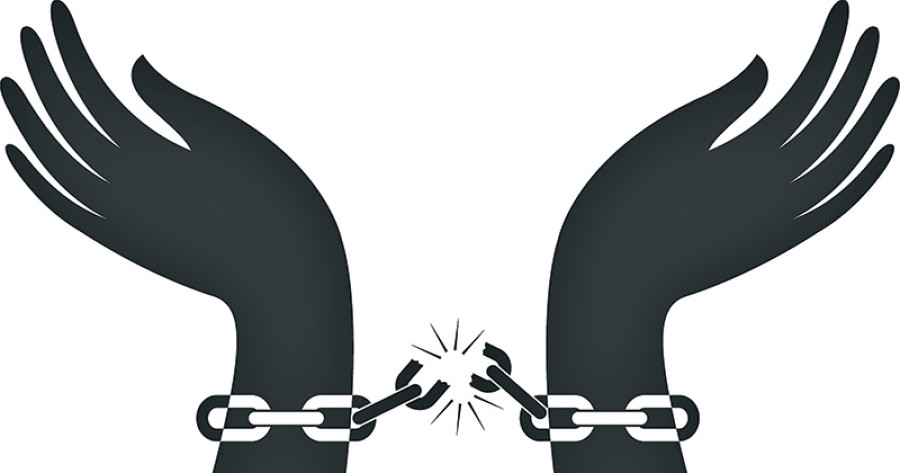Opinion
Holding their breath
People are curious to find out how rookie politician Mishra will deliver clean politics
Kalpana Subedi Pandit
Rabindra Mishra turned his back on a lucrative career at the BBC Nepali Service to start a political party in a move that astonished many Nepalis around the world. The popular journalist has pledged to clean up Nepali politics by deterring any form of corruption, nepotism and favouritism and promoting integrity, meritocracy and transparency. The ruling principle of Mishra’s party is liberal, welfare democracy. He has called it Sajha Party which seems to make it more inclusive. Many questions have been raised about Mishra’s political arrival and the significance of his party at this point in time.
The dark ages
Despite having a democracy, Nepal is politically in the Dark Ages, where decisions affecting national interest are made behind closed doors by the commanders of the major political parties. Corruption, bribery and violence have become a norm of politics. All institutions such as education, police force, civil service, health and so forth are deeply politicised, and consequently have become dysfunctional. Hundreds of thousands of people are forced to leave the country in search of work. The politics of ‘divide and rule’ is ripping up its social fabric and weakening social relations among different ethnic groups.
The need for a prudent new political force that can voice the country’s concerns at both national and international levels has been discussed by many. A few leaders have attempted to form such a force, but they all failed due to varied reasons like failure to regain trust, inability to incorporate a wider section of society, inability to disseminate information at the grassroots, lack of organisational skill and so forth. Mishra’s attempt to fill the vacuum is admirable, but the way he has come forward has raised a few critical questions about his ability to perform. He has not revealed a clear agenda or what kind of team he is going to put together.
Mishra’s plunge into politics after the age of 50 has raised a question about the appropriate age to enter politics. We have examples of leaders who made a late start and had a great influence on their party. US President Donald Trump won the election despite not having a political background. Instead of debating the right age to enter politics, the concern should be what ethical character a leader must maintain.
Determining factors
Political leaders must take responsibility for their entire agenda; and if they are rejected by the people, they should step down. However, in Nepal, leaders cling to their posts and try to maintain an authoritative influence in their parties for decades—even after endless failure—that does not allow newcomers to rise. The result of this practice is favouritism where politicians, instead of challenging the leaders, remain submissive to them in the hope of making a quick rise. Therefore, more than age, a politician’s character and ability to perform should be the determining factor. To receive recognition in politics, Mishra should debate ferociously on what kind of efforts should be made to get rid of substandard politics. He should initiate a new political culture to build faith in politics.
Many people in Nepal do not have much interest in politics as they have been disillusioned by leaders who never deliver on their promises. They think that Mishra’s decision to jump into politics is just another episode in the prevailing political culture. Likewise, the despicable games played by political leaders to win elections—like capturing polling booths, luring voters by throwing parties and handing out money to the poor—have wiped out faith in politics.
Against this backdrop, people wonder how Mishra will be able to achieve his aim of clean politics. So, it is vital for him to come forward ferociously and unveil a detailed agenda to influence people. Only by bringing a thoughtful and ambitious policy to address the injustices and inequalities prevalent in Nepali society can he prove his intellectual capacity to perform well amid the current political turmoil. He can exploit social media platforms like Facebook and Twitter extensively to disseminate the party’s radical agenda directly to the people. It is said that social media was a critical factor in Donald Trump’s election victory.
Finally, the significance of a powerful new political force has been continuously discussed by many. Mishra has been able to receive remarkable support from Nepalis in and outside the country. This is because of the positive influence he has made so far. The biggest challenge for him is to maintain this trust and accumulate much more in the coming days. For this purpose, it is vital for Mishra to come forward aggressively with a well organised team and a much clearer framework to address the present political crisis.
Pandit holds a Master’s in sociology from TU




 9.7°C Kathmandu
9.7°C Kathmandu










